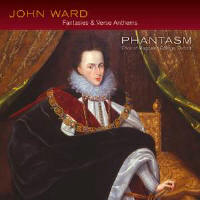Texte paru dans: / Appeared in:
|
|
|
Reviewer: Barry
Brenesal
Phantasm’s album of consort
music for five and six viols by John Ward (Linn 339; reviewed in Fanfare
33:4) must have been successful enough to call for a revisit of that master.
Here we have the result: a mix of consort fantasias with verse anthems, in
which the consort is joined by the Choir of Magdalen College, Oxford, under
Daniel Hyde’s direction.
You should know what to
expect, assuming you’re familiar with that previous release. Ward’s wealthy
patron, Henry Fanshawe, was an Italophile, but presumably preferred Roman
musical models to more forward looking Venetian ones, for Ward was steeped
in the by-then unfashionable Franco-Flemish tradition. As I wrote of his
music in that earlier album, he emphasizes “somber moods and canonical
procedures in long, flowing, metrically regular lines … postponing cadences
as long as possible through contrapuntal, harmonic, and rhythmic
manipulation.” It comes as no surprise that this preference works
hand-in-glove with the opening to Prayer is an endless chain, where a
succession of imitative points repeatedly postpone the opening line’s
cadence. Elsewhere, though, there is a similar sense of an unhurried weave
of parts not given to any change in musical tension, but only to passing
madrigalisms that illustrate literary points. The liner notes state that the C of E texts are upbeat rather than severe, which is not strictly true: Down, caitiff wretch has its share of Biblically-inspired trash-talking. But my point is that the music generally is far more severe than the texts, including the upbeat Praise the Lord, O my soul. Ward is at his most positive in several of the fantasias, such as the Fantasia 3 a4 (Viola da Gamba Society 23) and the Fantasia 6 a4 (VdGS 26). Even so, it appears to suit him only slightly more than Chesterton’s illustration of Blaise Pascal trying to dance as accompaniment to one of Edmund Bentley’s clerihews.
Phantasm’s performances do
find plenty of life in Ward’s music, however. Their flexible phrasing, warm
tone, and utter clarity between the parts brings warmth to even the most
somber and stately of the composer’s fantasias. The efforts of Daniel Hyde
and the Magdalen choristers are more difficult to evaluate. There are some
attractive voices, and phrasing of the choir as a whole is excellent.
Balance between the parts in This is a joyful, happy holy day is first-rate,
and pacing is vigorous. But I have serious concerns about the sound on this
release, and these prevent a full review of their efforts.
I don’t envy any engineering
team trying to balance a viol consort, solo singers, and choir; but to do so
in the Chapel of Magdalen College must have added yet another layer of
difficulty to sort out. In any event, the issues were not resolved. When the
consort is playing alone it sounds fine, and as much can be said about the
massed choir. But when the boy soloists enter the picture, as they do in
Praise the Lord, O my soul and Down, caitiff wretch, the consort swamps
them. All the soloists sound in fact as though were distanced from the
mikes, losing their tonal luster (though the basses suffer least, as you
might expect). Needless to say, almost every word is lost as well. The matter could be tentatively set aside if there were only one or two anthems on the disc out of 13 selections, but the total is seven. That moves matters into the problematic category, at best. Try before you buy is all I can recommend, or you might end up as disappointed as I am—a disappointment made all the worse by my admiration for the forces involved.
| |
|
|
|
|
Cliquez l'un ou l'autre
bouton pour découvrir bien d'autres critiques de CD |
|




